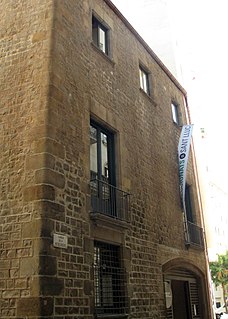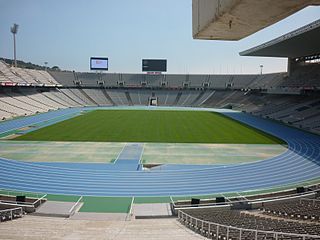A patronymic, or patronym, is a component of a personal name based on the given name of one's father, grandfather (avonymic), or an earlier male ancestor. A component of a name based on the name of one's mother or a female ancestor is a matronymic. A name based on the name of one's child is a teknonymic or paedonymic. Each is a means of conveying lineage.
A surname, family name, or last name is the portion of a personal name that indicates a person's family. Depending on the culture, all members of a family unit may have identical surnames or there may be variations based on the cultural rules.

Sephardi Jews, also known as Sephardic Jews,Hispanic Jews or Sephardim are a Jewish ethnic division originating from traditionally established communities in the Iberian Peninsula ; most were expelled from the region in the late 15th century. They had developed a distinctive diasporic identity that they carried with them to North Africa, South-eastern and Southern Europe, Anatolia, and the Levant, as well as the Americas, and all other places of their exiled settlement. They sometimes settled near existing Jewish communities, or were the first in new frontiers.
Spanish naming customs are historical traditions for naming children practised in Spain. According to these customs, a person's name consists of a given name followed by two surnames. Historically, the first surname was the father's first surname, and the second the mother's first surname. In recent years, the order of the surnames in a family is decided when registering the first child, but the traditional order is still largely the choice. Often, the practice is to use one given name and the first surname most of the time, the complete name being typically reserved for legal, formal, and documentary matters; however, both surnames are sometimes systematically used when the first surname is very common to get a more customized name. In these cases, it is even common to use only the second surname, as in "Lorca", "Picasso" or "Zapatero". This does not affect alphabetization: discussions of "Lorca", the Spanish poet, must be alphabetized in an index under "García Lorca" and not "Lorca".
In the Western tradition of surnames, there are several types of double surname. If the two names are joined with a hyphen, it may also be called a hyphenated surname. The word "barrel" probably refers to the barrel of a shotgun, as in "double-barreled shotgun".
Filipinos have various naming customs. They most commonly blend the older Spanish system and Anglo-American conventions, where there is a distinction between the "Christian name" and the "surname". The construct containing several middle names is common to all systems, but having multiple "first" names and only one middle and last name is a result of the blending of American and Spanish naming customs. The Tagalog language is one of the few national languages in Asia to practically use the Western name order while formally using the eastern name order. The Philippine naming custom is identical to the Spanish and Portuguese name customs and, to an extent, Chinese naming customs.
A Portuguese name is typically composed of one or two given names, and a number of family names. The first additional names are usually the mother's family surname(s) and the father's family surname(s). For practicality, usually only the last surname is used in formal greetings.

Sanbenito was a penitential garment that was used especially during the Spanish Inquisition. It was similar to a scapular, either yellow with red saltires for penitent heretics or black and decorated with devils and flames for impenitent heretics to wear at an auto da fé.
The Nova Cançó was an artistic movement that promoted Catalan music in Francoist Spain. The movement sought to normalize use of the Catalan language in popular music and denounced the injustices in Francoist Spain. The Grup de Folk, which emerged in the same period, also promoted a new form of popular music in Catalan, drawing inspiration from contemporary American and British music.

Lesseps is a station in the Barcelona Metro network, named after its location, Plaça de Lesseps, in the Gràcia district of Barcelona, itself named after Ferdinand de Lesseps, who was appointed French consul in 1842. The station is served by line L3.

The Cercle Artístic de Sant Lluc is an arts society which was founded in Barcelona (Catalonia) in 1893 by Joan Llimona, Josep Llimona, Antoni Utrillo, Alexandre de Riquer, the city councillor Alexandre M. Pons and a group of artists who were followers of bishop Josep Torras i Bages, as a reaction to the anticlerical current present in modernisme and in the Cercle Artístic de Barcelona, which they considered to be frivolous. The society was typified by its vigorous defence of Catholic morals and of family virtue, and its desire to follow in the path of humility that was pursued by the mediaeval guilds.

The Míting Internacional d'Atletisme Ciutat de Barcelona is an annual athletics meeting held at the Estadi Olímpic Lluís Companys in Barcelona, Catalonia, Spain. The Meeting was held annually from 1982 to 1990, in 1993 and annually from 1998 to 2000. Before 1990 it was held at Estadio Municipal Joan Serrahima. Re-established in 2008, it is usually held in mid-July. In 2011 it was a European Athletics premium meeting. The 2017 and 2018 editions returned to Estadio Municipal Joan Serrahima.
Sephardic Bnei Anusim is a modern term used to define the contemporary Christian descendants of an estimated quarter of a million 15th-century Sephardi Jews who were coerced or forced to convert to Catholicism during the 14th and 15th century in Spain and Portugal. The vast majority of conversos remained in Spain and Portugal, and their descendants in both these countries numbering in the millions. The small minority of conversos who did emigrate normally chose destinations where Sephardic communities already existed, particularly in the Ottoman Empire and North Africa, but also more tolerant cities in Europe, where they immediately reverted to Judaism. Although a few travelled to Latin America with colonial expeditions, doing so was particularly difficult, since only those Spaniards who could certify no recent Muslim or Jewish ancestry were allowed to travel to the New World. But the constant flow of Spanish emigration to Latin America until well into the 20th century resulted in many Latin Americans having Converso ancestry, in the same way as modern Spaniards do.
These are the results of the 1983 Ibero-American Championships in Athletics which took place from 23 to 25 September 1983 at Estadio Juan Serrahima in Barcelona, Spain.
Frank Montiéh is a Cuban track and field hurdler who competed in the 400 metres hurdles. He was the 1983 Pan American Games champion in the event and also the 1982 Central American and Caribbean Games champion.

The 2016 Women's Hockey Junior World Cup was the 8th edition of the Women's Hockey Junior World Cup. It was held from 24 November to 4 December 2016 in Santiago, Chile.
Juan Serrahima was a Spanish sprinter. He competed in the men's 100 metres at the 1928 Summer Olympics.
The 2019 Men's FIH Pro League was the first season of the Pro League and fourth edition of the men's field hockey national team league series. The tournament started in January 2019 and finished in June 2019 Amstelveen, Netherlands.

The 2017 Spanish Athletics Championships was the 97th edition of the national championship in outdoor track and field for Spain. It was held on 22 and 23 July at the Estadio Joan Serrahima in Barcelona. It served as the selection meeting for Spain at the 2017 World Championships in Athletics.

Lluís Serrahima i Villavecchia was a Spanish singer-songwriter. Born in Barcelona, he was known as the founder of the Nova Cançó, a music genre that became popular during the Francisco Franco regime. In the 1980s, he became vocal in the Generalitat de Catalunya.







